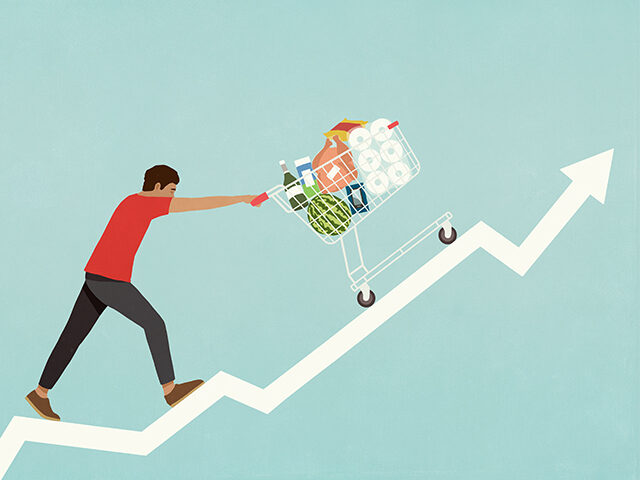The Unwelcome Return of Food Inflation
Just when you thought it was safe to venture back into the grocery stores, food inflation is roaring back.
The producer price index (PPI) for food rose 0.6 percent in July, the biggest increase since February. Annualized, this amounts to a 7.6 percent rate of food inflation. The index tracking finished consumer foods also rose by 0.6 percent following a 0.4 percent increase in the prior month.
There were some very steep increases in prices that American families likely noticed in July. The prices of fresh fruits and melons jumped 10.3 percent. Beef prices jumped 7.7 percent. Pork prices rose 1.8 percent. Coffee prices percolated up 3.3 percent.
The indexes for these items are seasonally adjusted, so the increases do not result from a seasonal taste for iced coffee or the surge in grilling burgers or ribs.
The cumulative effect has been devastating. Since Biden took office, the producer price index for food sold to consumers is up 26 percent. That’s five times as much inflation as we saw during Donald Trump’s White House tenure.
The summer surge in food prices suggests that inflation is very likely to remain a top concern for voters as we head toward election day. The latest polling by YouGov for the Economist indicates that 96 percent of voters say inflation is an important issue, including 77 percent who say it is very important. Twenty-four percent say it is the single most important issue, more than twice as many as for any other issue.
A survey released Monday by the Financial Times showed that 78 percent of registered voters say inflation has been one of the three biggest sources of personal financial stress over the past month, followed by income at 45 percent and rent at 31 percent. Asked to name the single biggest source of personal financial stress over the past three months, 45 percent said inflation, dwarfing income and rent, each at 13 percent.
And food inflation is at the heart of concern over price increases. Seventy-eight percent of people selected food inflation as having a big impact on their financial situation. That is followed by household supplies and everyday necessities at 55 percent and gasoline at 51 percent.
This July surge is likely to be all the more troubling for voters because they were told that food inflation was a thing of the past. Food prices, as measured by the PPI, rose mildly in March and actually declined in April and May. But they rose 0.4 percent in June and then accelerated again last month. This suggests the doom and gloom surrounding food prices has been better grounded in reality than the rosy projections of journalists, economists, and Democrat politicians telling us that we conquered food inflation.
Kamala Is Haunted by the Ghost of Rising Grocery Prices
Kamala Harris has very good reason to be concerned about inflation. Thirty-nine percent of registered voters name Democratic policies as one of the three major causes of price increases, according to the Financial Times poll. That puts it behind “large corporations taking advantage of inflation” at 59 percent and ahead of lasting pandemic impact at 35 percent. The Fed is named by just 26 percent and Republican policies by just 24 percent.

Vice President Kamala Harris delivers remarks on the one-year anniversary of the Inflation Reduction Act on August 15, 2023, in Seattle. (Official White House Photo by Polly Irungu via Flickr)
Harris, following Joe Biden’s lead, has been trying to divert the public’s attention away from Democrat policies and onto “corporate greed.” After not mentioning inflation for a few weeks, she has recently taken to saying something along the lines of these words from her Michigan speech (according to Chris Giles of the Financial Times):
We believe in a future where we lower the cost of living for America’s families so they have a chance not just to get by but to get ahead. Because, look, while our economy is doing well by many measures, prices for everyday things like groceries are still too high. You know it and I know it.
When I was attorney-general, I went after price-fixing schemes. And when I am president, it will be my day one priority to fight to bring down prices; to take on the big corporations that engage in illegal price gouging; take on corporate landlords that unfairly raise rents on working families; to take on Big Pharma and cap the cost of prescription drugs for all Americans. That is the work we will do together.”
The problem is Harris does not actually believe half of this, and the half she does believe isn’t true.
As Giles of the FT points out:
Notice there is no talk about disinflation, but an ambition to bring down prices and some specific areas where Harris would like to act. Taken literally, this is a call for the Fed and other parts of government to lower the price level and seek deflation. If this were literally true, the only valid response would be, “you cannot be serious.”
Giles concludes that we’re not meant to take Harris pledge to bring down prices as literally true. “The upshot: Take Harris seriously, but not literally,” Giles writes. She does not mean what she’s saying when she promises to bring down prices.
The other half of her argument is that inflation is mostly caused by “illegal price gouging” and “price-fixing schemes” and the like. The trouble with this thesis is that last month’s food inflation happened while profit margins—measured as “trade services” in the PPI—decreased.
Overall trade services fell 1.3 percent in July, the largest monthly decline since 2015. Trade services for food retailing plunged 3.7 percent, the largest decline since 2009. Compared with a year ago, retail food profit margins are up just o.2 percent, lagging behind almost every major indicator of inflation. Whatever is driving food inflation, it is not greed, price-fixing, or price-gouging.
The FT poll showed that 38 percent of registered voters want Harris to take a completely different approach from Biden’s economic policies. Another 23 percent want major changes. Following Biden’s “greedflation” script is not going to do it.

COMMENTS
Please let us know if you're having issues with commenting.